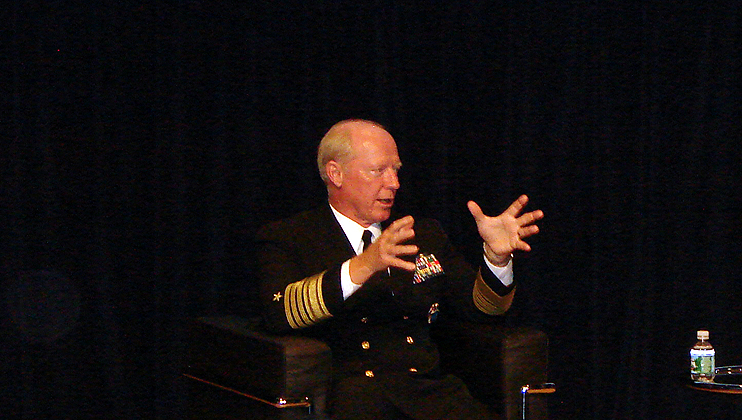Thursday, April 7, 2011 | 5:30 PM EDT - 5:30 PM EDT
NYIT |
In early March, China’s central government proposed a defense budget for 2011 that increases military spending nearly 13 percent over 2010. As China expands and modernizes its armed forces, it holds an increasingly influential position in Asian-Pacific security. China has been a crucial player in the Six Party Talks on North Korea’s nuclear proliferation during the last decade. Over the last two years, China’s naval presence in the Asia-Pacific has resulted in several skirmishes with nearby nations as well as with the United States. Although regional tensions are far from a boiling point, these incidents may be indicative of a changing security landscape in Asia.
Admiral Robert F. Willard, commander of U.S. Pacific Command (PACOM), examined the current security situation in Asia in a discussion moderated by National Committee President Stephen Orlins, hosted by the New York Institute of Technology. The Admiral also focused on China’s critical role in security relationships.
Admiral Willard is a graduate of the United States Naval Academy; he received his master’s degree in engineering management from Old Dominion University. He is also an alumnus of MIT’s Seminar XXI, an educational program for senior military officers, government and NGO officials, and executives in the national security policy community designed to give future leaders the advanced analytical tools required to understand and evaluate the myriad factors that affect foreign policy decisions. Admiral Willard has been the commander of PACOM since October 2009. From May 2007 to October 2009, he was commander of the U.S. Pacific Fleet and, prior to that, he was the 34th vice chief of naval operations.
Politics & Foreign Relations
Recorded 4/7/11
Politics & Foreign Relations
Adm. Robert F. Willard is the Commander, U.S. Pacific Command, Camp H.M. Smith, Hawaii.
Willard is a Los Angeles native and a 1973 graduate of the United States Naval Academy. He has a Master’s degree in Engineering Management from Old Dominion University and is an MIT Seminar XXI alumnus.
An F-14 aviator, Willard served in a variety of west coast fighter squadrons; VF-24, VF-124, VF-2, and VF-51 aboard the aircraft carriers USS Constellation, USS Ranger, USS Kitty Hawk and USS Carl Vinson. He was operations officer and executive officer of Navy Fighter Weapons School (TOPGUN) and aerial coordinator for the movie. He later commanded the Screaming Eagles of Fighter Squadron 51.
Following nuclear-power training, Willard served as executive officer of USS Carl Vinson (CVN 70), commanded the amphibious flagship USS Tripoli (LPH 10) in the Persian Gulf during Operation Vigilant Warrior for which Tripoli received a Navy Unit Commendation and commanded the aircraft carrier USS Abraham Lincoln (CVN 72).
As a flag officer, Willard twice served on the Joint Staff, was deputy and chief of staff for U.S. Pacific Fleet at Pearl Harbor, Hawaii, commanded Carrier Group Five aboard USS Kitty Hawk (CV 63) and commanded the U.S. 7th Fleet in Yokosuka, Japan. In March 2005, Willard became the 34th vice chief of naval operations; in May 2007, he assumed command of the U.S. Pacific Fleet; and on October 19, 2009, he became the commander, U.S. Pacific Command, Camp H.M. Smith, Hawaii.
Willard’s decorations include the Defense Distinguished Service Medal, Distinguished Service Medal, Legion of Merit and various other awards.
